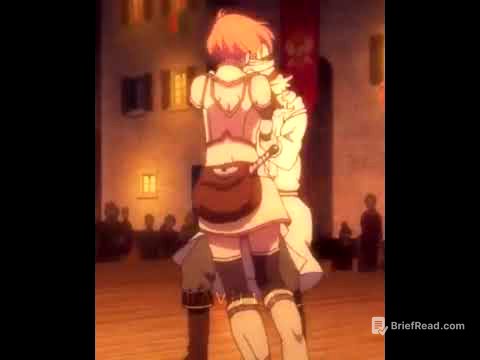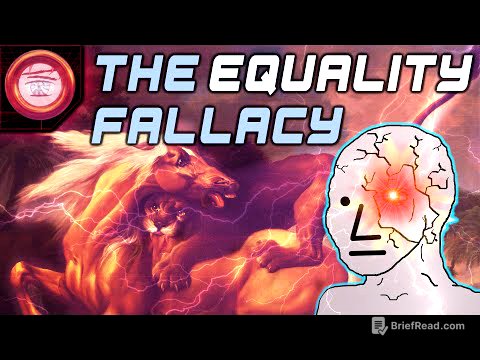TLDR;
In this Father's Day sermon, Kevin Wallace discusses the concept of sonship with God, emphasizing that believers have received the spirit of adoption, allowing them to call God "Abba, Father." He contrasts this with a spirit of religious bondage, which keeps people on a treadmill, unsure of their standing with God. Wallace encourages listeners to embrace their identity as children of God, understanding that they are heirs with Christ, destined for glorification. He addresses the diversity within the church, reminding everyone that salvation is through faith in Jesus, not works. The sermon challenges the congregation to move beyond a mere surface-level understanding of faith and to confront the truth that sets them free from religious bondage, enabling them to fully experience their sonship with God.
- Believers have received the spirit of adoption, allowing them to call God "Abba, Father".
- Salvation is through faith in Jesus, not works.
- Religious bondage keeps people on a treadmill, unsure of their standing with God.
Introduction: I Call Him Abba [0:00]
Kevin Wallace introduces his sermon on Father's Day, focusing on Romans 8:14-17. He emphasizes that those led by the Spirit of God are sons of God, having received the spirit of adoption, which allows them to call God "Abba, Father." As children of God, believers are heirs—joint heirs with Christ—destined for glorification, even amidst suffering.
The Importance of Truth [2:53]
Wallace explains that he has been teaching from the book of Romans for the past five weeks. He addresses the desire for teachings on breakthroughs and blessings, asserting that the truth itself brings these things. He cautions against ignorance that prevents people from walking in God's blessings, emphasizing the importance of confronting and digesting the truth, even when it offends. The intent of truth is to set people free from bondage, which many may be masking with religious activities.
The Roman Church: A Diverse Congregation [5:58]
Wallace describes the Roman church as a diverse congregation of Jews and Gentiles, each with different backgrounds and theological conclusions. He reminds them that all were born in sin and that salvation comes through faith in Jesus Christ, making them new creations. He criticizes the American church for being divided, forgetting that Jesus saved them all.
Works Don't Save You [9:24]
Wallace reminds the church that works, circumcision, and the law cannot save them. The law is like a mirror, revealing imperfections but not fixing them. He emphasizes that the Savior came to make them whole, and in Christ, they have been made new.
The Jews and the Gentiles [11:05]
Wallace explains that for Jewish people, Jesus was an interruption to their lawkeeping, reminding them that breaking one law means breaking them all. For Gentiles, it means they can leave their old lives behind. He emphasizes that if their life before Christ was a mess, they should run from it and that their transformation is a testimony to God's grace.
The Old Man is Dead [13:50]
Wallace states that Paul helps the Jews to get off the treadmill of trying to please God through works and reminds the Gentiles that their old selves are dead. He references Romans 6, stating that the old man was crucified with Christ, so they should remind the devil that their old self is dead when he tries to remind them of who they used to be.
Religious Bondage vs. Spirit of Adoption [14:25]
Wallace explains that lawkeeping produces people who do not understand sonship and can only connect to God through their works. He emphasizes that when they got saved, they did not receive a spirit of bondage that leads them back into religious practices. The bondage Paul speaks of is religious bondage, where people think God is hard to please. He contrasts this with the spirit of adoption, which they received when they were born again.
The Prodigal Son: A Story of Grace [21:12]
Wallace uses the parable of the prodigal son from Luke 15 to illustrate his point. The son, after wasting his inheritance, decides to return home, but only as a servant. However, the father doesn't wait for him to reach home; he runs to him, embraces him, and restores his position as a son. Wallace explains that the church often has funerals for people Jesus came to have a party over.
Aba, Father: A Term of Affection [27:52]
Wallace emphasizes that believers receive the spirit of adoption, allowing them to cry out, "Aba, Father." He explains that "Aba" is an Aramaic term of affection, while "Father" is the Greek word "pater." He believes Paul is saying that God is the creator and father of all flesh, but those in the family know Him as "Aba."
Adoption Papers: Irrevocable Agreement [33:52]
Wallace shares a personal story about his adopted children, bringing out their adoption papers to illustrate that the laws protect adopted children even more than biological ones. He emphasizes that what makes them his is not just the papers but their presence and the fact that they call him "Dada."
Call to Salvation and Freedom [37:35]
Wallace makes a call to salvation, inviting those who know they are not right with God to come forward and surrender to Jesus. He also prays for those who love Jesus but struggle with a religious mindset, asking God to break the orphan spirit and set them free to step into their identity as sons and daughters. He encourages them to step out of agreement with the lie of religion and into agreement with the truth.









